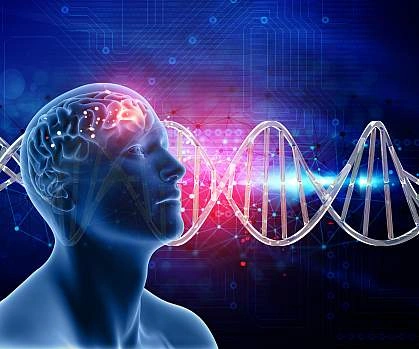Vegetarian genetic

If you tested your DNA with a personal genomics service like 23andMe, AncestryDNA, FamilyTreeDNA, MyHeritage or another testing company, you can learn more about your risk factors for hundreds of diseases. By clicking the button above ⬆️, you can upload your raw DNA data file and receive a personalized 250-page health report with research links that is the most comprehensive.
Various reasons drive individuals to experiment with a vegetarian diet, ranging from ethical and religious beliefs to the potential health and environmental advantages. However, adhering to this dietary lifestyle can be challenging for many. Research indicates that several self-proclaimed vegetarians still consume animal products.
A recent research sheds light on the possible genetic basis that supports a person's commitment to a rigorous vegetarian diet.
After examining genetic information from more than 5,000 individuals adhering to a strict vegetarian diet and 329,455 control subjects, scientists pinpointed genes that have a significant correlation with vegetarianism. These genes primarily affect lipid metabolism and brain function.
The pioneering research establishes genetics as a credible element that impacts dietary choices beyond ethical and spiritual beliefs, opening up possibilities for more intricate comprehension of the relationship between genetics and diet.
The research reveals a possible genetic inclination that affects the adherence to a vegetarian diet. It pinpoints three genes that have a significant impact and 31 genes that may be linked to vegetarianism, with many of them affecting lipid metabolism and brain function.
The ability to sustain a vegetarian diet may be linked to differences in lipid metabolism and their impact on the brain, as some of the genes linked to vegetarianism, such as TMEM241, NPC1, and RMC1, play crucial roles in both lipid metabolism and brain function.
The findings provide evidence for the influence of genetics on the decision to adopt a vegetarian diet and pave the way for future investigations into the physiological mechanisms underlying vegetarianism.
Follow the link of the selected polymorphism to read a brief description of how the selected polymorphism affects Vegetarian diet and see a list of existing studies.
SNP polymorphisms related to the topic Vegetarian diet:
| rs1421085 | Variation in the FTO gene contributes to obesity in children and severe obesity in adults. |
| rs1799883 | This genotype is associated with increased sensitivity to both saturated fat and refined carbohydrates. Thus, allele A impairs the effectiveness of both low-carbohydrate and low-fat diets. |
| rs602662 | The polymorphism is associated with reduced levels of vitamin B12 in the blood, this effect may be due to reduced absorption of vitamin B12, such people need additional vitamin B12 supplementation in the form of injections. |
| rs429358 | The APOE-E4 allele has a strong influence on the risk of developing Alzheimer's disease. One meta-analysis estimated the odds ratio for individuals homozygous for rs429358 to be 12 times higher for late-onset Alzheimer's disease and 61 times higher for early-onset disease. People with APOE4-4 allele C genotype should avoid eating animals raised on plants/grains that have higher levels of omega-6 compared to omega-3. It is advisable to practice vegetarianism to avoid all animal fats and measure the ratio of omega-3 to omega-6 in these people. Also, people with APOE 4 may do better on unmethylated forms of B12. |
| rs7566605 | Sustained weight loss effect in carriers of the risk allele C polymorphism of the INSIG2 gene rs7566605 when following a vegetarian diet. |
| rs12934922 | Reduced conversion of beta-carotene to retinol. Supplemental retinol intake is recommended. |
| rs7501331 | Reduced conversion of beta-carotene to retinol. Supplemental retinol intake is recommended. |
| rs1801394 | Polymorphism can lead to elevated homocysteine levels independent of folic acid, vitamin B12 or B6 levels. It is a risk factor for neural tube defects and Down syndrome in the setting of higher homocysteine levels. |
| rs1805087 | Moderate risk factor for hyperhomocysteinaemia. A factor that increases the body's need for folic acid and vitamin B12. |
| rs174547 | Genetic variants that affect circulating lipid levels and risk of cardiovascular disease. People with the C gene variant have lower levels of long forms of fatty acids such as AA. Vegetarians and vegans with the C gene variant have lower plasma concentrations of EPA, DHA and AA than omnivores. Vegetarians with the C gene variant have been shown to benefit from omega-3 supplements or omega-3 rich foods such as chia seeds, flax seeds and canola oil. |
| rs7946 | Genetic polymorphisms in methyl group metabolism DNA methylation in peripheral blood. Affect the human need for choline (vitamin B4). |
| rs601338 | FUT2 gene fragment affects serum vitamin B12 concentration via hologaptocorrin. Presumably reduces the amount of vitamin B12 absorption from food and tablets. Administration of B12 in the form of injections is recommended. |
| rs492602 | B12 levels are 1.5 times higher in women. |
| rs4994 | A beta-3-adrenergic receptor mutation is associated with visceral obesity but lowers serum triglyceride levels. Carriers of the G allele necessarily need strength training to lose weight and keep the body in good shape. |
| rs7412 | |
| rs12325817 | |
| rs4646343 | |
| rs1531100 | |
| rs4646365 | |
| rs572169 | |
| rs4684677 | |
| rs26747 | |
| rs509325 | |
| rs6545790 | |
| rs7560575 | |
| rs2196476 | |
| rs3760188 | |
| rs587056 | |
| rs35867081 | |
| rs60259426 | |
| rs6089240 | |
About The Author
Li DaliLi Dali, a National Foundation for Outstanding Youth Fund recipient, is a researcher at the School of Life Sciences in East China Normal University. He earned his PhD in genetics from Hunan Normal University in 2007 and conducted collaborative research at Texas A&M University during his doctoral studies. Li Dali and his team have optimized and innovated gene editing technology, leading to the establishment of a world-class system for constructing gene editing disease models.


